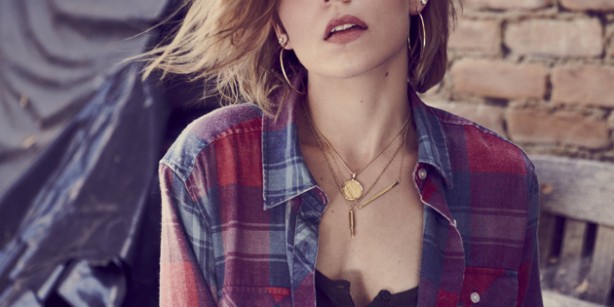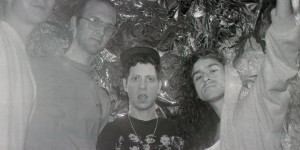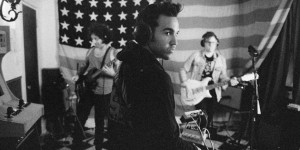 Music
Music
Eminem protegé Skylar Grey gets accustomed to the spotlight
by Mark Teo
November 12, 2013
Skylar Grey isn’t used to the spotlight. Not yet, at least.
Skylar Grey isn’t used to the spotlight. Not yet, at least. Although she’s dabbled with sensitive singer-songwriter fare in the past (under the name Holly Brook), amongst industry heads, she’s better known as a powerhouse songwriter; famously, she wrote the hook for Eminem’s and Rihanna’s “Love the Way You Lie.” Obviously, Em was impressed—not only did she become his protégé, but he’s also encouraged her own songwriting career.
That promise is finally realized on Don’t Look Down, which dropped this summer, in which Grey emerged as a hold-no-punches pop star: Atop gleaming guitars and Travis Barker’s athletic drums, Grey tackles everything from domestic violence to accidental pregnancy (on the perfectly titled “Shit Man!”). Which, like Eminem—who wore the executive producer’s hat on Don’t Look Down—had Grey straddling the line between cinema verité topics and pop songs. “Everything is authentic,” she tells us, “and it’s kind of uncomfortable that people know that information about me.” It’s the classic artist’s dilemma. We sat down with Grey to talk about her tell-all songcraft, Eminem’s mentorship, and old-time religion.
You tackle everything from domestic violence to unplanned pregnancy on your album. Where do these stories come from?
They come from a real place, and sometimes, it’s like I’m naked to the world. I write everything based on either real-life experience of my own or somebody really close to me, so they’re really genuine.
“Love the Way You Lie” is a scathing breakup song. I take it you went through a really acrimonious split?
That and “Final Warning” were written in the same week. The screaming match in that song was actually a friend of mine and his girlfriend, and I had them come to the studio. I didn’t want to ruin my voice, because I had so much singing to do that day. So I wasn’t about to just scream all day, so I had them come in and do it, and afterwards, they were crying, and we are like, “Baby, let’s never be like that!” [Laughs.] It was really sweet.
A lot of your songs are dark. Was it important for you to write stories that were authentic, in that they don’t necessarily have easy solutions and happy endings?
I think that life is about experiencing things, whether it’s good or bad. Many of my songs are inspired by darker things, but there’s a positive twist to a lot of the songs. “Final Warning” is dark, but at the same time, it’s also a female anthem—it’s about standing up for yourself and not taking shit from anyone.
I always want something uplifting in my songs. Thematically, I guess my album is about coming into your own and figuring out who you are as a person and growing up. I’ve been coming into to my own and was discovering myself as both a person and an artist, and I have a whole new vision and plan for my career. Everyone has a different path—but that’s why I called my album Don’t Look Down. I mean, everyone has a goal, and we shouldn’t be afraid to achieve it—so don’t look back, don’t look down.
On another topic, what’s your relationship like with Eminem?
I got to work with him on “Love the Way You Lie” and “I Need a Doctor” with Dr. Dre, too. We performed together at the Grammys. We’ve just been continuing to work together, and when I made my album, it was natural for him to come on board and help me pick the song. He gave me a lot of great feedback—he made suggestions about where I could improve songs.
What kind of suggestions would he give you?
The first thing that comes to mind is “Only Thing I Hear.” He said, “I love the song, I love what you’re talking about. But musically, it’s the same throughout.” He suggested that I add some change to the bridge, and he said to try some bucket drums. So I went to Travis Barker, and was like, “Do you know how to play bucket drums?” And he was like, “Yeah, I can play everything.” So I got him to play buckets on the song—but it’s only on the Spotify [and Rdio] album.
Oh, I’ll tell you another example! On “Come on and Let Me Ride,” I brought that song to Detroit with only a hook and a verse. When he added his part, he told me that we need to make it clear that you’re sarcastic—and that’s why we added the “I’m only fucking with you” part on the bridge. That was his idea.
Don’t Look Down is a step towards writing for yourself, not for others. Are the stakes higher when you’re attaching your actual name to songs?
There’s really no difference, because all the songs come from a genuine place—all the songs are based on a true emotion I’ve felt. Therefore, I didn’t really change anything when I wrote for other people. I’ve walked out of sessions because I didn’t like what [was presented]. But I guess that’s what you deal with when you’re dealing with an artist. [Laugh.]
“Religion” isn’t necessarily about religion—oftentimes, it questions whether God is real. What was the goal of the track?
Sometimes, you question whether there’s a God or not when things are going really badly in your life. It’s about making the promise to somebody that you’ll always be there for them. And everyone needs that.

This article originally appeared in the November 2013 Issue of AUX Magazine.
Download and subscribe for free in the app store.





